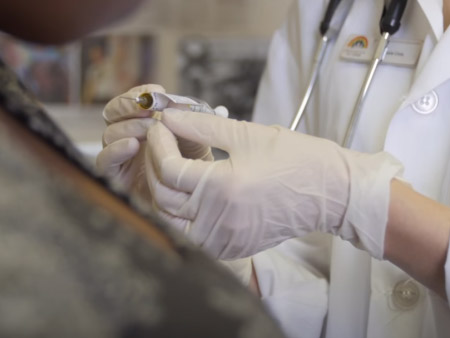NIAID Observes HIV Vaccine Awareness Day 2021
Topics
Cross-posted from NIAID Now blog

Credit: NIAID
While implementation of highly effective HIV treatment and prevention tools has reduced the HIV pandemic worldwide, development of a safe and even modestly effective vaccine would hasten progress toward a durable end of the HIV pandemic. Today, on HIV Vaccine Awareness Day, NIAID acknowledges both the progress that has been made in HIV vaccine development and the challenges that remain. We also reflect on how advances in HIV vaccinology paved the way for COVID-19 vaccine development.
HIV is a uniquely challenging vaccine targetExit Disclaimer, and an HIV vaccine likely will need to trigger immune responses better than those produced naturally in response to HIV infection. Researchers are pursuing multiple approaches toward this goal.
One approach, now in late-stage clinical trials, is based on "mosaic" immunogens, vaccine components comprising elements from multiple HIV subtypes. These immunogens aim to induce immune responses against the wide variety of global HIV strains. A Phase 2b study called Imbokodo (HPX2008/HVTN 705) is evaluating the safety and efficacy of a mosaic-based vaccine regimen among more than 2,600 women in southern Africa. Men and transgender people who have sex with men are being enrolled in a complementary Phase 3 study called Mosaico (HPX3002/HVTN 706) taking place in the Americas and Europe.
Another HIV vaccine strategy involves harnessing the potential of broadly neutralizing antibodiesExit Disclaimer (bNAbs), which can stop a wide variety of HIV strains from infecting human cells in the laboratory. Results reported in January from the Antibody-Mediated Protection (AMP) Studies demonstrated that passive administration of a bNAb can prevent a person from acquiring HIV strains susceptible to that antibody. Currently, early-stage clinical trials are testing several next-generation bNAbs, individually and in combination, for HIV prevention. In parallel, scientists are working to develop candidate vaccines that can elicit bNAbs in healthy people.
The decades of research that have brought us closer to a preventive HIV vaccine also facilitated the development of vaccines against SARS-CoV-2, the virus that causes COVID-19. Although HIV and SARS-CoV-2 are very different pathogens, lessons learned from HIV vaccinology helped researchers rapidly develop safe and effective COVID-19 vaccines.
For example, scientists at NIAID’s Vaccine Research Center (VRC) pioneered a technique known as structure-based vaccine design. This enabled them to introduce changes to the envelope protein on HIV’s surface to stabilize it in its “native conformation,” which can bind HIV bNAbs and is considered a promising vaccine immunogen. VRC researchers next applied this approach to develop a powerful immunogen for a vaccine against respiratory syncytial virus. When MERS emerged, VRC scientists followed the same principles to stabilize the spike protein on the surface of MERS coronavirus in its prefusion form. Thanks to these experiences, VRC scientists and their academic collaborators were able to rapidly develop a stabilized version of the SARS-CoV-2 prefusion spike protein, which is used in the three COVID-19 vaccines currently available in the United States under emergency use authorization as well as others in clinical trials.
Additionally, NIAID has leveraged its HIV research infrastructure and expertise to conduct clinical trials evaluating SARS-CoV-2 vaccines, as well as other potential COVID-19 prevention strategies and COVID-19 treatments. Experiences with engaging affected communities in HIV research planning and implementation continue to inform the COVID-19 response.
As we make progress against COVID-19, work to address HIV has continued at a brisk pace. NIAID applauds the resilience of the HIV clinical trial participants, researchers, health care professionals, advocates, and other members of the global community who are continuing to advance HIV vaccine development and related HIV prevention research.